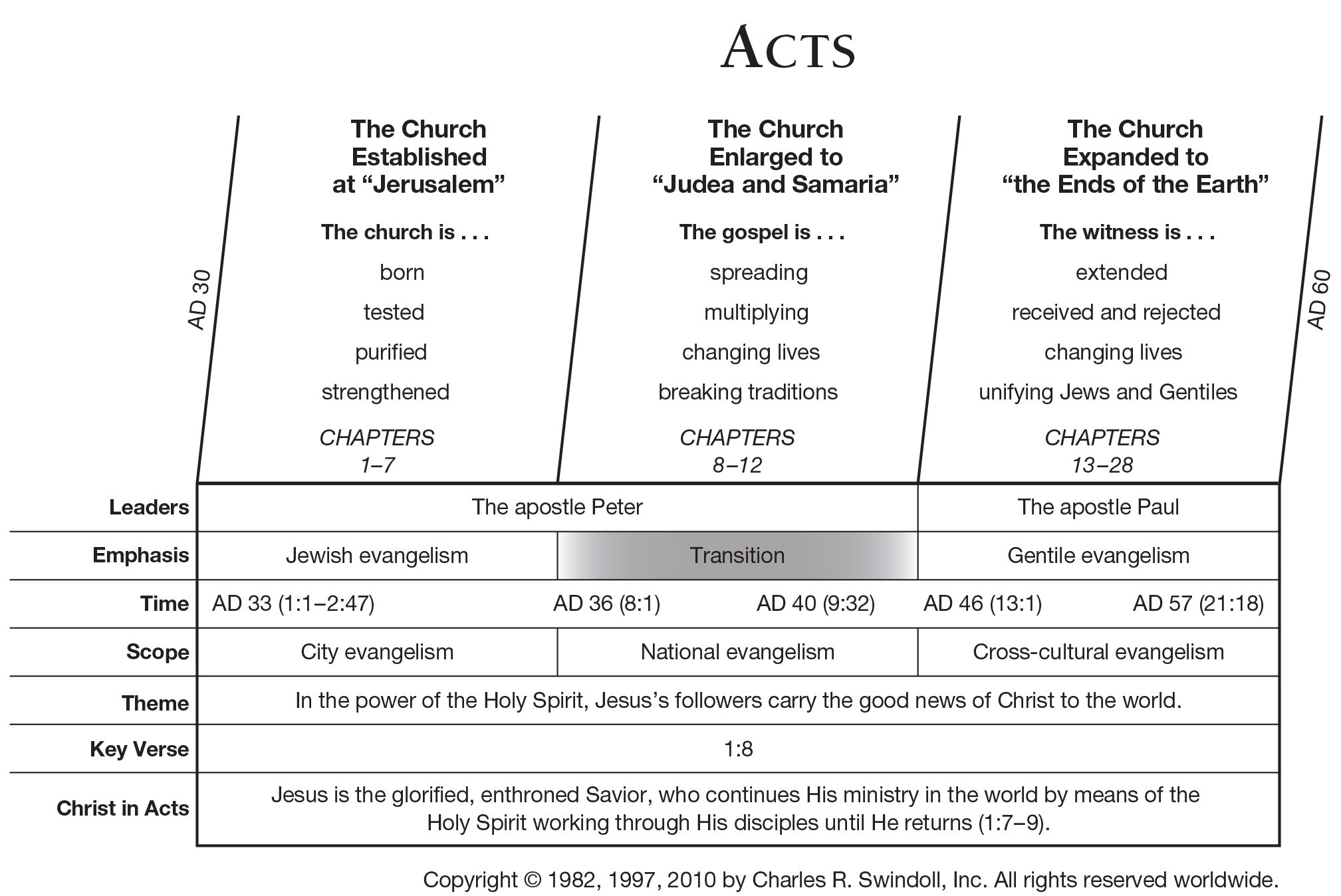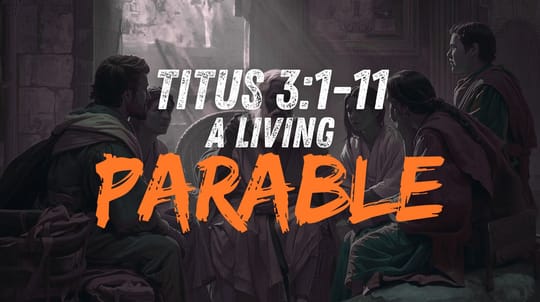Like a good detective, let's examine this book.
🔥 Overview
The book of Acts is the sequel to the Gospel of Luke. Luke picks up where he left off and tells the story of the early church. It begins with the ascension of Jesus and ends with the house arrest of Paul. The church didn't end with Acts 28. If you enjoy the book of Acts, I highly suggest reading the early church fathers. There are so many more adventures that happen in the early church. However, these accounts were inspired by God to inspire, encourage, and challenge the church for centuries.
🔍 Things to Notice
- Matthias becomes the replacement for Judas.
- The Holy Spirit empowers the early church to spread the Gospel. First, to the Jewish audience and then to the gentile people in the house of Cornelius.
- The second half of the book transitions to the journeys of Paul.
🙏 Jesus in this Book
(Every book reveals the glory of God, revealed in Christ Jesus)
- The power of the Holy Spirit
- The joy in the face of persecution
- The Gospel moves us forward
👀 Themes
- The Holy Spirit descends
- Persecution of the Church
- Nothing can stop the Good News
😀 Who?
Who wrote it: Luke
Who is the original audience: This is the second letter to Theopolis. No one knows for sure who Theopolis was. It is likely he was a healthy benefactor who funded Luke's journey to research and write the history of the early church. Some have speculated it could have been Paul's advocate who would have defended him before Caesar.
🪧 Where?
Where are we: Likely in Rome, while tending to Paul in prison.
⏳ When?
When was it written: Paul is beheaded between 64-68 A.D. Luke does not record the earth of Paul and it appears he has not yet died by the end of Luke's account. Therefore, Acts was likely written between 6-62 AD.
🤔 What?
What is the big idea: Acts is divided into two sections, the church as a whole and the ministry of Paul on his way to Rome. The goal of Acts is to articulate the movement of the early church and how, despite the odds, God's Kingdom continues to move forward. God wants His message of hope to extend to all. Nothing can stand in the way of the church when it is committed to spreading the Good News of the Kingdom.
🧐 Why?
Why is this book important: The Story of the early church.
📝 How?
How can I apply it?: Realize the Kingdom of God comes in power. The Holy Spirit empowers us to live a life of freedom and to spread the Good News of the Gospel. We should never live as a victim to fear. We should live with joy, faith, and boldness to show the goodness of God to all.

Quick Thoughts on Each Chapter
Chapter 1: This is the second book by Luke to someone named Theopolis. History does not give us much info on who this is. It ranges from Paul's possible attorney before the Emperor to a wealthy patron who funded Luke to do the research for his letters.
Chapter 2: The "Day of Pentecost" is actually the first of the Fall Harvest Feast Days for Israel where as many Jewish men as possible were required to go to Jerusalem. Pentecost is 50 days after Passover when Jesus was crucified and rose from the dead. The Bible also says Jesus was with them for 40 days. This means they only had to wait 10 days from when Jesus ascended to Heaven and the outpouring of the Holy Spirit.
Chapter 3: Amazing to this this disabled man had probably been passed by Jesus many times. However, this day was His day. God does not always heal us when we want but when the timing is right. Only He knows that.
Chapter 4: Verse 13... They called Peter and John "ordinary men." The word they used is where we now have the word idiots. Lol What is most amazing is they looked at Peter and John and could tell they had been with Jesus. May we look that way to all around us.
Chapter 5: This chapter tells of an act of judgement toward people who openly tried to deceive the church as well as exploit those in need for the sake of looking good. They were not judged for lying to Peter. They were judged for all the other things.
Chapter 6: The formation of "church government." The ultimate task of church leadership is to teach the scriptures and the Jesus way. However, that doesn't stop the need of other things. So, 7 men were recommended to the apostles for serving the church. This was because there was still issues between jewish born and gentile born believers. The people in the early church were still human like all of us. They still needed a lot of grace... just like us.
Chapter 7: The full discourse by Stephen is probably recorded because it was a full account of what the church was teaching. Stephen is careful to say that Jesus was not teaching a new religion. He is God continuing and fulfilling the promises He made long ago. He starts with appealing to their love of orator and the story of the Israelite people. But, as we will see tomorrow, he is about to make a hard right into... well... you'll see.
Chapter 8: History says the Ethiopian Eunuch's name was probably Simeon Bachos. This would have meant he was likely a high ranking official to Candice, the Queen of the Ethiopians. After this amazing moment, he went back to Ethiopia proclaiming the Gospel to everyone who would listen.
Chapter 9: This chapter speaks of the amazing conversion of Saul. An unsung hero in this story is Ananias. Can you imagine enjoying your prayer time and then having the Holy Spirit ask you to go talk to someone who wants you dead? Ugh... God? There must be a bad connection... sure not! Yep. Trust me.
Chapter 10: This chapter is a big deal. Most if not all Jewish people did not realize God's plan to give salvation to all. It had been taught by many rabbis that the gentiles would be blessed by the Jews, not God Himself. This is why is was so scandalous for Peter to preach the Gospel. God is Savior of all.
Chapter 11: The church of Antioch became one of the leading churches for a long time in the early church. What's amazing is there is no record of who started the church. It is the nameless who will receive the greatest honor in Heaven.
Chapter 12: There are two men with the name "James" mentioned here. The first is the brother of John (the writer of the Gospel of John) who is killed. The other is James, the half-brother of Jesus. The second James was actually most likely the leader of the church in Jerusalem. He was also called James-the-Just and was admired even by the unbelieving Jews.
Chapter 13: Verse 29-23- Some historians believe Paul died at Lystra and the church prayed him back to life. This would have been when he experienced a vision of Heaven he talks about later.
Chapter 14: On his journeys, Paul would often encounter the "greek god" culture. Talking about God was not a problem. Saying that Yahweh is supreme over all... was a problem. Imagine telling someone everything they have ever believed is a lie. Not everyone will receive it well as you can see from today's reading.
Chapter 15: Today's reading can be read along with the book of Galatians. Paul writes in Galatians about going to Jerusalem basically to make sure they were all on the same page. Paul would reach people for Jesus and then some jews would come behind and try to change things. He tells them to stop doing that. It was not the message of Jesus that was in question. It was what happens after.
Chapter 16: Timothy joins the team. Timothy would later become the pastor of one of the largest churches, the Ephesians. This is also the same pastor to whom Paul writes 1 & 2 Timothy.
Chapter 17: Athens- known from history as a people group that prided themselves on philosophy and stoic reasoning. Paul preaches to them using their own logic to describe and promote Jesus. Powerful example of how the Gospel is not only logical but also powerful.
Chapter 18: Paul goes to Corinth. Corinth was a port city and what we would call a modern day "sin city." Much like Las Vegas what happened in Corinth stayed in Corinth. This is why Paul wrote 4 different letters to the church in Corinth to continually straighten out messes. 2 of those letters were inspired by God and we now have in the Bible.
Chapter 19: Verses 11-20- The idea of the spirit world and demonic possession was nothing new. When people saw the Name of Jesus had power, they tried to mimic what was going on to gain notoriety. The problem is that it is not the name that is powerful. It is the person that name represents. All of the spirit world knows when you just say the name of Jesus and when you are referring to the Only Wise Sovereign Rule of All Creation.
Chapter 20: Verses 22-23- Some of said that, if the Holy Spirit warned Paul in every city he visited that prison was waiting in Jerusalem, he was disobeying God by going. This is wrong. The text does not say the Holy Spirit warned Paul not to go. It says the Holy Spirit was preparing Paul for what awaited. God had already spoken to Paul about what was coming. Therefore, these warnings was not to stay away, but could be seen as reminders so he was not surprised or taken off guard.
Chapter 21: Verse 17- James was the half brother of Jesus and considered so righteous before God that even his detractors nicknamed him "James the Just." He was the leader of the church in Jerusalem and was eventually martyred by being thrown from the Temple Mount. I always wondered what it would have been like for Paul to have heard the stories of Jesus from the half-brother's POV.
Chapter 22: It was a big deal to be a Roman citizen, especially if you have been one from birth. You could be killed for hurting a Roman citizen without cause. This is how Paul is able to escape death. This is also how Paul would have been uniquely suited among the early disciples to travel unhindered throughout the known world.
Chapter 23: Governor Felix was a terrible leader. He was very corrupt and, under his reign, crime increased. He was later recalled to Rome because of all his excesses and only escape death because of a well connected family.
Chapter 24: This chapter gives us a small window into what the Roman government system was like. Not unlike today. There are courts, judges, etc. Many times there was also corruption and scheming as well. Even in this corrupt, broken government God was able to get Paul to Rome. How much more can He accomplish His will in our lives despite less than ideal circumstances?
Chapter 25: Agrippa- This was Herod Agrippa II. He was deposed just a few years after this. His father was the guy in Acts 12.
Chapter 26: Depending on your translation, Paul says that Jesus asked, "Is it hard for you to kick against the goads?" (ESV) A goad (or your transitions equivalent) is a tool used to heard livestock. They would be used to lead them, even against their will, into the right direction. This could be Jesus saying, "You think your resisting me, but I am actually in charge of all things."
Chapter 27: Because they waiting so long to head toward Rome, they encountered the stormy season. It is not uncommon that the ship would be lost. What IS amazing is that no one died from this event. In 2 Corinthians, Paul says he was shipwrecked three times and one time spent a day and a night a drift at sea. I cannot help but wonder if this was the time he drifted for that long to the shore.
Chapter 28: This chapter ends the way it does because this would have been all that Luke would know at the time. Paul would later be arrested again by Nero. He was eventually beheaded. This form of execution was considered an honorable, less painful death that was given to Roman citizens. His citizenship is likely the only reason he was not crucified like so many other apostles such as Peter and Andrew.
Resources
Link: Insight for Living (The graphic above comes from here)
Link: Bible Hub
Link: Got Questions
Link: Life, Hope, And Truth
Link: Jesus in Every Book of the Bible
Link: The Bible Project (Quick videos about the Bible)
Read the Bible Online
















